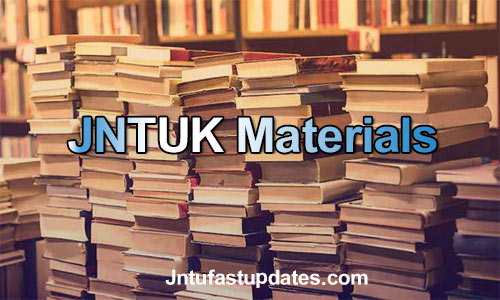JNTUK R16 4-2 Wireless Sensors & Networks Material/Notes PDF Download
Students those who are studying JNTUK R16 Civil Branch, Can Download Unit wise R16 4-2 Wireless Sensors & Networks (WSN) Material/Notes PDFs below.

JNTUK R16 4-2 Wireless Sensors & Networks Material/Notes PDF Download
UNIT-1
OVERVIEW OF WIRELESS SENSOR NETWORKS: Key definitions of sensor networks, Advantages of sensor Networks, Unique constraints an challenges, Driving Applications, Enabling Technologies for Wireless Sensor Networks. ARCHITECTURES: Single-Node Architecture – Hardware Components, Energy Consumption of Sensor Nodes, Operating Systems and Execution Environments, Network Architecture -Sensor Network Scenarios, Optimization Goals and Figures of Merit, Gateway Concepts.
UNIT-2
NETWORKING Technologies: Physical Layer and Transceiver Design Considerations, Personal area networks (PANs), hidden node and exposed node problem, Topologies of PANs, MANETs, WANETs.
UNIT-3
MAC Protocols for Wireless Sensor Networks: Issues in Designing a MAC protocol for Ad Hoc Wireless Networks, Design goals of a MAC Protocol for Ad Hoc Wireless Networks, Classifications of MAC Protocols, Contention – Based Protocols, Contention – Based Protocols with reservation Mechanisms, Contention – Based MAC Protocols with Scheduling Mechanisms, MAC Protocols that use Directional Antennas, Other MAC Protocols.
UNIT-4
ROUTING PROTOCOLS: Introduction, Issues in Designing a Routing Protocol for Ad Hoc Wireless Networks, Classification of Routing Protocols, Table –Driven Routing Protocols, On – Demand Routing Protocols, Hybrid Routing Protocols, Routing Protocols with Efficient Flooding Mechanisms, Hierarchical Routing Protocols, Power – Aware Routing Protocols, Proactive Routing
UNIT-5
TRANSPORT LAYER AND SECURITY PROTOCOLS: Introduction, Issues in Designing a Transport Layer Protocol for Ad Hoc Wireless Networks, Design Goals of a Transport Layer Protocol for Ad Hoc Wireless Networks, Classification of Transport Layer Solutions, TCP Over Ad Hoc Wireless Networks, Other Transport Layer Protocol for Ad Hoc Wireless Networks,
UNIT-6
SECURITY IN WSNs: Security in Ad Hoc Wireless Networks, Network Security Requirements, Issues and Challenges in Security Provisioning, Network Security Attacks, Key Management, Secure Routing in Ad Hoc Wireless Networks. SENSOR NETWORK PLATFORMS AND TOOLS: Sensor Node Hardware – Berkeley Motes, Programming Challenges, Node-level software platforms, Node-level Simulators, State-centric programming. APPLICATIONS of WSN: S Ultra wide band radio communication, Wireless fidelity systems. Future directions, Home automation, smart metering Applications
TEXT BOOKS:
- Ad Hoc Wireless Networks: Architectures and Protocols – C. Siva Ram Murthy and B.S.Manoj, 2004, PHI
- Wireless Ad- hoc and Sensor Networks: Protocols, Performance and Control – Jagannathan Sarangapani, CRC Press
- Holger Karl & Andreas Willig, “Protocols And Architectures for Wireless Sensor Networks”, John Wiley, 2005.
REFERENCE BOOKS:
- Kazem Sohraby, Daniel Minoli, & Taieb Znati, “Wireless Sensor Networks- Technology, Protocols, and Applications”, John Wiley, 2007.
- Feng Zhao & Leonidas J. Guibas, “Wireless Sensor Networks- An Information Processing Approach”, Elsevier, 2007.
- Ad- Hoc Mobile Wireless Networks: Protocols & Systems, C.K. Toh ,1 ed. Pearson Education.
- Wireless Sensor Networks – C. S. Raghavendra, Krishna M. Sivalingam, 2004, Springer
- Wireless Sensor Networks – S Anandamurugan , Lakshmi Publications

320-x100(1).gif)

